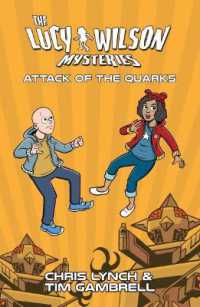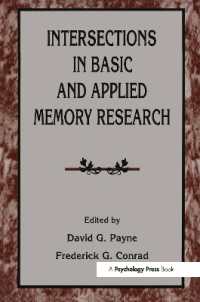- ホーム
- > 洋書
- > 英文書
- > Cinema / Film
Full Description
From early silent features like The Lodger and Easy Virtue to his final film, Family Plot, in 1976, most of Alfred Hitchcock's movies were adapted from plays, novels, and short stories. Hitchcock always took care to collaborate with those who would not just execute his vision but shape it, and many of the screenwriters he enlisted—including Eliot Stannard, Charles Bennett, John Michael Hayes, and Ernest Lehman—worked with the director more than once. And of course Hitchcock's wife, Alma Reville, his most constant collaborator, was with him from the 1920s until his death.
In Hitchcock and Adaptation: On the Page and Screen, Mark Osteen has assembled a wide-ranging collection of essays that explore how Hitchcock and his screenwriters transformed literary and theatrical source material into masterpieces of cinema. Some of these essays look at adaptations through a specific lens, such as queer aesthetics applied to Rope, Strangers on a Train, and Psycho, while others tackle the issue of Hitchcock as author, auteur, adaptor, and, for the first time, present Hitchcock as a literary source. Film adaptations discussed in this volume include The 39 Steps, Shadow of a Doubt, Lifeboat, Rear Window, Vertigo, Marnie, and Frenzy. Additional essays analyze Hitchcock-inspired works by W. G. Sebald, Don DeLillo, Bret Easton Ellis, and others.
These close examinations of Alfred Hitchcock and the creative process illuminate the significance of the material he turned to for inspiration, celebrate the men and women who helped bring his artistic vision from the printed word to the screen, and explore how the director has influenced contemporary writers. A fascinating look into an underexplored aspect of the director's working methods, Hitchcock and Adaptation will be of interest to film scholars and fans of cinema's most gifted auteur.
Contents
Acknowledgments
Introduction: Hitchcock and Adaptation, Mark Osteen
I: Hitchcock and Authorship
Chapter 1: Hitchcock the Author, Thomas M. Leitch
Chapter 2: Wrong Men on the Run: The 39 Steps as Hitchcock's Espionage Paradigm, Walter Raubicheck and Walter Srebnick
Chapter 3: The Role and Presence of Authorship in Suspicion, Patrick Faubert
II. Hitchcock Adapting
Chapter 4: Melancholy Elephants: Hitchcock and Ingenious Adaptation, Ken Mogg
Chapter 5: Conrad's The Secret Agent, Hitchcock's Sabotage, and The Inspiration of "Public Uneasiness," Matthew Paul Carlson
Chapter 6: Stranger(s) Than Fiction: Adaptation, Modernity, and the Menace of Fan Culture in Hitchcock's Strangers on a Train, Leslie H. Abramson
Chapter 7: Reading Hitchcock/Reading Queer: Adaptation, Narrativity, and a Queer Mode of Address in Rope, Strangers on a Train, and Psycho, Heath A. Diehl
Chapter 8: "Dear Miss Lonelyhearts": Voyeurism and the Spectacle of Human Suffering in Rear Window, Nicholas Andrew Miller
Chapter 9: "The Proper Geography": Hitchcock's Adaptation of Daphne du Maurier's "The Birds," John Bruns
Chapter 10: From Kaleidoscope to Frenzy: Hitchcock's Second British Homecoming, Tony Williams
III. Hitching a Ride: The Collaborations
Chapter 11: Hitchcock's Diegetic Imagination: Thornton Wilder, Shadow of a Doubt, and Hitchcock's Mise-en-Scène, Donna Kornhaber
Chapter 12: "The Name of Hitchcock! The Fame of Steinbeck!"—The Legacy of Lifeboat, Maria A. Judnick
Chapter 13: "What did Alma Think?":Continuity, Writing, Editing, and Adaptation, Christina Lane and Jo Botting
IV. Adapting Hitchcock
Chapter 14: The Second Look, the Second Death: W. G. Sebald's Orphic Adaptation of Hitchcock's Vertigo, Russell J. A. Kilbourn
Chapter 15: Dark Adaptations: Robert Bloch and Hitchcock on the Small Screen, Dennis R. Perry and Carl H. Sederholm
Chapter 16: Extraordinary Renditions: DeLillo's Point Omega and Hitchcock's Psycho, Mark Osteen
Chapter 17: The Culture of Spectacle in American Psycho, David Seed
Alfred Hitchcock Filmography
About the Contributors
About the Editor








